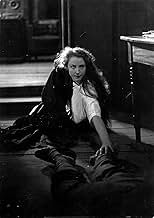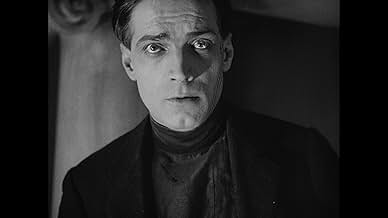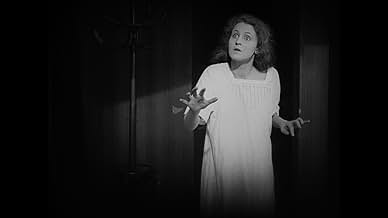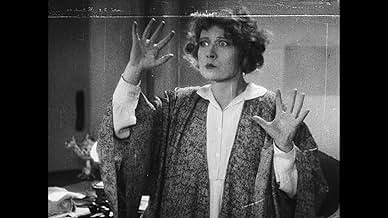NOTE IMDb
7,2/10
928
MA NOTE
En Crimée, les Rouges et les Blancs n'ont pas fini de se battre et Jeanne découvre que l'homme qu'elle aime est un Bolchevique (quand il tue son père). Sans le sou, elle retourne à Paris où ... Tout lireEn Crimée, les Rouges et les Blancs n'ont pas fini de se battre et Jeanne découvre que l'homme qu'elle aime est un Bolchevique (quand il tue son père). Sans le sou, elle retourne à Paris où elle travaille pour son oncle.En Crimée, les Rouges et les Blancs n'ont pas fini de se battre et Jeanne découvre que l'homme qu'elle aime est un Bolchevique (quand il tue son père). Sans le sou, elle retourne à Paris où elle travaille pour son oncle.
- Réalisation
- Scénario
- Casting principal
Margarete Kupfer
- Hotel Maid
- (as Küpfer)
Robert Scholz
- Chief of Police
- (as Scholz)
Avis à la une
Just saw this film and was very impressed with the style and story. Like all the others who have commented, I was immediately drawn in to the story and characters. Even though there were minimal subtitles, the story was not difficult to follow. It is a different way to tell a story where body movement and gestures replace the voice. The orchestral soundtrack was well matched to the mood and action. I had never heard of this film and only found it by accident when searching on whatever became of Bridgit Helm who did not pursue acting after (?) this final film. It is also a historical drama and has interesting details of life in that time. Definitely one of the great films of that era.
Love of Jeanne Ney(1927) is an involving Wartime melodrama with images that impress. Definitely the work of a great director in G.W. Pabst who is the second greatest filmmaker in German Silent films right after Fritz Lang. Includes a post Metropolis role for Brigitte Helm. Acting is very good and the set designs are some of the best in Silent cinema. A downbeat film with a contrasting happy ending.
I know that G. W. Pabst is a world-famous director, so I know that many will disagree with me on this one, but I truly disliked "Die Lebe der Jeanne Ney". I also know that it has a much more than respectable overall score of 7.9...but I just thought the film was very overrated and there are much better German films of this era. Most of my reasons for disliking the film are because the script is just goofy and makes little sense, but I also thought that the performance of the supposedly blind woman was very poor and I would have expected more of Pabst.
The film begins during the Russian Revolution. Jeanne and her father are there on some sort of diplomatic-type mission and her father laments that the years spent in the country have been a waste of time. At this point, you see Jeanne thinking about her experiences--falling in love with a Communist and her championing of the Bolshevik revolution. This is the sort of plot, by the way, that NEVER would have been allowed just a few years later during the Nazi years--no way would such a film ever see the light of day because it is pro-Communist.
An evil schemer, Khalibiev, has created a list of supposed Communinists and sold it to Mr. Ney. Jeanne's lover comes to Ney to demand the list and in the process he kills his lover's father. Jeanne comes in to see this happen and soon flees to Paris to stay with an uncle. However, and this makes no sense at all, she STILL is in love with her Bolshevik boyfriend--even though she knows he murdered her father--who she supposedly loved!! Who writes this sort of stuff?! Once in Paris, Jeanne is lusted after by her nasty Uncle--who happens to be a private detective. At the same time, her blind cousin is courted by Khalibiev--who ALSO lusts after Jeanne!! Eventually the Uncle is killed by Khalibiev (it's a long story) and Jeanne's Communist lover (who just happens to be in Paris as well--it's odd how NONE of the Russians in the film seem to stay in Russia!!) is implicated. So, it's up to the plucky Jeanne to save the day.
Very little of this movie seems plausible. Mostly it's because of Jeanne's unwillingness to bear some sort of grudge for the murder of her father, but there is still more that makes no sense. Khalibiev is a scoundrel but is so unsubtle and obvious you wonder why it took anyone more than a fraction of a second to suspect him! And as for the blind girl, she needed acting lessons and Pabst did nothing to stop this overacting. Get this....in her own home where she has lived for years, the lady gropes around like she's never been there before AND she never looks towards people when they talk. Had Pabst or this bad actress spent more than a minute or two with a blind person, then they would have realized this was all wrong. Yes, I expect that by 1927 the films had become sophisticated enough that they should have gotten this right.
Overall, the film is a silly trifle and not much more. For a better German silent film, try something by Fritz Lang or F.W. Murnau...or a good film by G. W. Pabst, such as "Die Freudlose Gasse" or "Tagebuch Einer Verlorenen". Or, see and here Pabst's brilliant sound film "Westfront 1918", for that matter.
The film begins during the Russian Revolution. Jeanne and her father are there on some sort of diplomatic-type mission and her father laments that the years spent in the country have been a waste of time. At this point, you see Jeanne thinking about her experiences--falling in love with a Communist and her championing of the Bolshevik revolution. This is the sort of plot, by the way, that NEVER would have been allowed just a few years later during the Nazi years--no way would such a film ever see the light of day because it is pro-Communist.
An evil schemer, Khalibiev, has created a list of supposed Communinists and sold it to Mr. Ney. Jeanne's lover comes to Ney to demand the list and in the process he kills his lover's father. Jeanne comes in to see this happen and soon flees to Paris to stay with an uncle. However, and this makes no sense at all, she STILL is in love with her Bolshevik boyfriend--even though she knows he murdered her father--who she supposedly loved!! Who writes this sort of stuff?! Once in Paris, Jeanne is lusted after by her nasty Uncle--who happens to be a private detective. At the same time, her blind cousin is courted by Khalibiev--who ALSO lusts after Jeanne!! Eventually the Uncle is killed by Khalibiev (it's a long story) and Jeanne's Communist lover (who just happens to be in Paris as well--it's odd how NONE of the Russians in the film seem to stay in Russia!!) is implicated. So, it's up to the plucky Jeanne to save the day.
Very little of this movie seems plausible. Mostly it's because of Jeanne's unwillingness to bear some sort of grudge for the murder of her father, but there is still more that makes no sense. Khalibiev is a scoundrel but is so unsubtle and obvious you wonder why it took anyone more than a fraction of a second to suspect him! And as for the blind girl, she needed acting lessons and Pabst did nothing to stop this overacting. Get this....in her own home where she has lived for years, the lady gropes around like she's never been there before AND she never looks towards people when they talk. Had Pabst or this bad actress spent more than a minute or two with a blind person, then they would have realized this was all wrong. Yes, I expect that by 1927 the films had become sophisticated enough that they should have gotten this right.
Overall, the film is a silly trifle and not much more. For a better German silent film, try something by Fritz Lang or F.W. Murnau...or a good film by G. W. Pabst, such as "Die Freudlose Gasse" or "Tagebuch Einer Verlorenen". Or, see and here Pabst's brilliant sound film "Westfront 1918", for that matter.
"After the Russian Revolution, Civil war raged in the Crimea, bringing in its wake chaos and misery and unscrupulous men."
It is after the revolution Jeanne and her father record the events. Looks like her father is on the losing side when the Red Army arrives. He is dispatched and she is sent to Paris. That is where the story of the revolution ends and a good old-fashioned mystery begins, from the loss of a diamond to even possibly murder.
I always knew that the movie was a classic but other than G. W. Pabst (I have quite a few of his films); I just realized that this was from a novel by Ilja Ehrenburg. Looks like I have some reading to do. And I was surprised to see Brigitte Helm (Metropolis - The Creative Man/The Machine Man/Death/The Seven Deadly Sins/Maria). This film has many facets.
It is after the revolution Jeanne and her father record the events. Looks like her father is on the losing side when the Red Army arrives. He is dispatched and she is sent to Paris. That is where the story of the revolution ends and a good old-fashioned mystery begins, from the loss of a diamond to even possibly murder.
I always knew that the movie was a classic but other than G. W. Pabst (I have quite a few of his films); I just realized that this was from a novel by Ilja Ehrenburg. Looks like I have some reading to do. And I was surprised to see Brigitte Helm (Metropolis - The Creative Man/The Machine Man/Death/The Seven Deadly Sins/Maria). This film has many facets.
Georg Wilhelm Pabst (or GW Pabst, born in 1885) was one of the great German filmmakers during the silent period. He established his name with his first film, the drama of greed "The Treasure" (1923), but with the third one, "The Joyless Street" (1925) he revealed himself as a major force of the "New Objectivity", beyond the distortions of expressionism, touching the social problems of Germany, between the two great wars. He continued with "Mysteries of a Soul" (1926) and "The Love of Jeanne Ney" (1927), whose recent vision motivates these notes; then gave a masterstroke with "Pandora's Box" (1929), which led Louise Brooks to immortality, and when sound came, in 1930 he released the antiwar drama" Frontline 1918 ", which was banned by the Nazis, made the film version of "The 3-Penny Opera" (1931) by Brecht and Weil, followed by a drama of Franco-German solidarity, "Camaraderie" (1931); an incursion into fantastic cinema with "L'Atlantide" (1932), and his own reading of Cervantes' "Don Quixote" (1933). Although he did not stop working and made more films of value, Pabst saw his career affected by the rise of the Nazis, when he had to move between Berlin, Paris, Hollywood and Vienna, where he died in 1967.
The romantic account of "The Love of Jeanne Ney" goes from Ukraine to France, following the daughter of a French diplomat who is in love with a Bolshevik. The couple reunites in Paris after several vicissitudes. The characters include Jeanne's uncle, owner of a research firm, his blind daughter (Brigitte Helm, the Maria of "Metropolis"), a North American millionaire who has lost an invaluable diamond, and a Russian informer who sells to the highest bidder. There are moments of great visual force, as the scene in which the blind girl discovers the corpse of her father and the initial scenes of the Russian revolution.
However, the reason that motivates me to write about the film is, above all, extraordinary actor Fritz Rasp (1891-1976), as the ruthless snitch, fearsome as none. Rasp is an icon of the Teutonic villain: from the first time I saw him as the overwhelming "Thin Man" in Lang's "Metropolis," serving the owner of the city, every time I see him in another film, his characters are not to be trusted and his presence is intimidating: as the colonel in "Spies" and as "The Man" in "The Woman in the Moon", both by Lang, or as the Jew J. J. Peachum, "King of the Beggars", in Pabst's "The 3-Penny Opera". In "The Love of Jeanne Ney" Rasp builds the disgusting character of Khalibiev, an informant who fingers the Bolsheviks in Ukraine, and in Paris not only does he stalk Jeanne and her lover, but uses Jeanne's young blind cousin to concrete his evil plans.
As Pabst, Rasp also continued working during the Nazi period, although not acting with the frequency of the past. He had a long career, that included playing the lead in a film of the "new cinema" of West Germany, "Lina Braake" (1975), which was his last appearance in cinema.
The romantic account of "The Love of Jeanne Ney" goes from Ukraine to France, following the daughter of a French diplomat who is in love with a Bolshevik. The couple reunites in Paris after several vicissitudes. The characters include Jeanne's uncle, owner of a research firm, his blind daughter (Brigitte Helm, the Maria of "Metropolis"), a North American millionaire who has lost an invaluable diamond, and a Russian informer who sells to the highest bidder. There are moments of great visual force, as the scene in which the blind girl discovers the corpse of her father and the initial scenes of the Russian revolution.
However, the reason that motivates me to write about the film is, above all, extraordinary actor Fritz Rasp (1891-1976), as the ruthless snitch, fearsome as none. Rasp is an icon of the Teutonic villain: from the first time I saw him as the overwhelming "Thin Man" in Lang's "Metropolis," serving the owner of the city, every time I see him in another film, his characters are not to be trusted and his presence is intimidating: as the colonel in "Spies" and as "The Man" in "The Woman in the Moon", both by Lang, or as the Jew J. J. Peachum, "King of the Beggars", in Pabst's "The 3-Penny Opera". In "The Love of Jeanne Ney" Rasp builds the disgusting character of Khalibiev, an informant who fingers the Bolsheviks in Ukraine, and in Paris not only does he stalk Jeanne and her lover, but uses Jeanne's young blind cousin to concrete his evil plans.
As Pabst, Rasp also continued working during the Nazi period, although not acting with the frequency of the past. He had a long career, that included playing the lead in a film of the "new cinema" of West Germany, "Lina Braake" (1975), which was his last appearance in cinema.
Le saviez-vous
- AnecdotesMilly Mathis's debut.
- Versions alternativesTwo different edits of the film exist. The A Negative, for the American market (86 mins) and the B negative, for the German market (105 mins). The two versions feature different camera angles and some cuts were made for the American market.
- ConnexionsFeatured in Die UFA (1992)
Meilleurs choix
Connectez-vous pour évaluer et suivre la liste de favoris afin de recevoir des recommandations personnalisées
Détails
- Durée
- 1h 44min(104 min)
- Mixage
- Rapport de forme
- 1.33 : 1
Contribuer à cette page
Suggérer une modification ou ajouter du contenu manquant



































